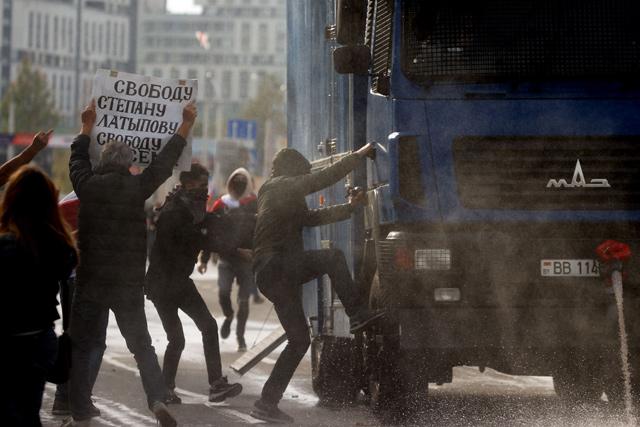You are here
Belarus police use water cannon in Minsk, detain protesters
By AFP - Oct 04,2020 - Last updated at Oct 04,2020

Protesters try to stop a water cannon truck during a rally demanding to free jailed activists of the opposition in Minsk on Saturday (AFP photo)
MINSK — Belarusian police on Sunday used water cannon to disperse a rally in Minsk as tens of thousands of demonstrators took to the streets in the latest weekend protest against strongman Alexander Lukashenko's disputed reelection.
Demonstrators dedicated their march — which came after Brussels and Washington introduced sanctions against a number of Belarusian officials — to the plight of political prisoners.
But after it had begun in the centre of the capital, police confirmed they had moved in on the protest, which like others was considered an illegal gathering.
Interior ministry spokeswoman Olga Chemodanova told AFP that water cannon had been used in Minsk and that there had been detentions, but provided no further details.
Rights group Viasna said demonstrators were detained in the capital Minsk as well as other places including Vitebsk and Gomel.
Ahead of the march authorities withdrew the accreditation of all foreign journalists in Belarus, complicating the coverage of opposition demonstrations.
Belarusians this week also received official text messages saying they could face criminal responsibility for taking part in "unsanctioned" rallies.
"Do not make a mistake!" the interior ministry said.
The opposition movement calling for an end to Lukashenko's rule has kept up a series of large-scale demonstrations since his controversial election win on August 9, with 100,000 people or more taking to the streets every Sunday.
Ahead of the rally, the Nexta Live opposition Telegram channel, which has coordinated protesters and has more than two million subscribers, urged Belarusians to march towards a detention centre in Minsk in support of political prisoners.
"These are people who have suffered for their convictions — and are still suffering", Lukashenko's election rival Svetlana Tikhanovskaya said in a statement ahead of the protest.
"Our task is to set them free."
According to Viasna there are now 77 “political prisoners” in Belarus including Tikhanovskaya’s husband and opposition blogger Sergei Tikhanovsky, who was not allowed to run for president, and senior opposition figure Maria Kolesnikova, who ripped up her passport to prevent authorities from deporting her.
Sanctions, countersanctions
Also on the list is Belarusian-US strategist Vitali Shkliarov, who has worked on US Senator Bernie Sanders’s presidential campaign and advised the Russian opposition. He was arrested in late July as he arrived to see his elderly parents.
Russia has backed its longstanding ally Lukashenko, offering financial backing and promising military support if events turn against him.
On Friday, the United States and the European Union hit Belarus with long-awaited sanctions for rigging the vote and orchestrating the crackdown on protesters, targeting key officials — but not Lukashenko himself.
Minsk swiftly announced tit-for-tat “counter sanctions” against the EU, although it was not clear what form these would take or what or who they would target.
The interior ministry has used water cannon, stun grenades and rubber bullets and in the first protests after the election detained thousands of people, many of whom complained of torture and abuse in custody.
Several people have died in the crackdown.
Tikhanovskaya ran in place of her jailed husband and claimed victory over Lukashenko.
After taking shelter in EU member Lithuania, the 38-year-old political novice has been engaged in a diplomatic push to drum up support for the embattled Belarusian opposition.
She has met French President Emmanuel Macron and will travel to Germany for a meeting with Chancellor Angela Merkel on Tuesday.
Student Dmitry Demeshkevich, who planned to take to the streets on Sunday, said he was aware of the sanctions and Tikhanovskaya’s upcoming talks with Merkel.
He said the sanctions were a gesture of support but “nothing more” as it was not clear if the Western punitive measures including travel bans would work.
“It’s better to begin talks with Lukashenko over his exit,” he said.
Lukashenko, who has ruled ex-Soviet Belarus for 26 years, has accused Western countries and NATO of supporting protesters and trying to destabilise the country.
Related Articles
MINSK — Opposition protesters in Belarus rallied on Sunday in the latest of nearly four months of demonstrations against the reelection of P
MINSK — More than 700 people were jailed following latest anti-government protests in Belarus, the interior ministry said on Monday, as ange
MINSK — Opposition protesters in Belarus took to the streets of capital Minsk on Sunday in the latest of three months of demonstrations agai











